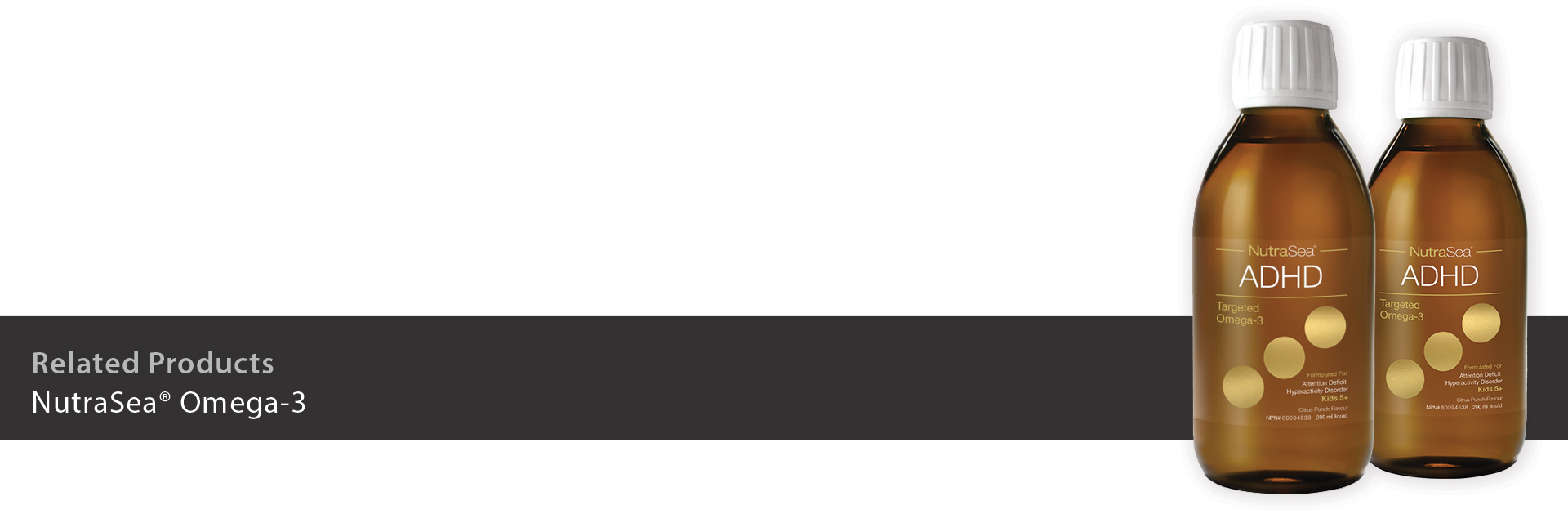Omega-3 Fatty Acids for Children’s Health
You may have heard that omega-3 is good for you as an adult, but did you know it’s just important for kids! Omega-3’s are available in 3 main forms – alpha-linolenic acid (ALA), eicosapentaenoic acid (EPA), and docosahexaenoic acid (DHA).[1] Research suggests that omega-3 forms EPA & DHA are beneficial for both adults and children. [1]
ALA (alpha-linolenic acid) is found in high-fat plant foods like flax seeds, walnuts and leafy greens.[1] However, because our bodies must first convert ALA to EPA (eicosapentaenoic acid) and DHA (docosahexaenoic acid), it’s a less efficient source of beneficial fatty acids, with studies showing that we convert ALA into EPA and DHA at a rate of only 5%.[2,3] EPA and DHA are the two most beneficial omega-3 fatty acids because they can be metabolized directly, providing the most immediate benefit to the human body. EPA and DHA can be found in foods like cold-water fish, seafood, and algae.
Research suggests that throughout the human life span, beneficial omega-3 fatty acids play an important role in many aspects of our physical and mental health.[4] Omega-3 has been shown to offer health benefits for infants and children:
Pregnancy and Infant Health
EPA and DHA are vital building blocks for healthy fetal brain and retina development.[5] Maternal DHA is the primary source of this fatty acid for the fetus since it can’t be synthesized directly in either the fetus or the placenta. Breastmilk is also a source of omega-3 fatty acids.[5]
Eye and Brain Development in Children
The retina contains the body’s highest concentration of DHA [6], so omega-3s are considered especially important for healthy eye and brain development in children up to age of 12 years. DHA also makes up over 90% of the fatty acids in the brain.
ADHD in Children
Attention-deficit/hyperactivity disorder (ADHD) is characterized by developmentally inappropriate and impairing inattention, impulsivity, and hyperactivity. EPA and DHA, along with a unique omega-6 fatty acid called gamma linolenic acid (GLA), may help to reduce symptoms associated with ADHD in children.[7] Dietary supplementation with fish oils (providing EPA and DHA) appears to alleviate ADHD-related symptoms in at least some children, and one study of DCD children also found benefits for academic achievement.[8]
NutraSea Targeted ADHD
While it’s not a replacement for prescription, NutraSea Targeted ADHD may help reduce the symptoms associated with ADHD in school-age children.
It is always a good idea to consult with your healthcare provider or dietician if you have specific questions about how a dietary supplement could benefit you and your family.
References:
[1] Harris WS. Omega-3 fatty acids. In: Coates PM, Betz JM, Blackman MR, et al., eds. Encyclopedia of Dietary Supplements. 2nd ed. London and New York: Informa Healthcare; 2010:577-86 taken from: https://shop.natureswaycanada.ca/blogs/news/omega-3s-101
[2]Plourde, M. and S.C. Cunnane, Extremely limited synthesis of long chain polyunsaturates in adults: implications for their dietary essentiality and use as supplements. Appl Physiol Nutr Metab, 2007. 32(4): p. 619-34.
[3]Brenna, J.T., Efficiency of conversion of alpha-linolenic acid to long chain n-3 fatty acids in man. Curr Opin Clin Nutr Metab Care, 2002. 5(2): p. 127-32.
[4] https://shop.natureswaycanada.ca/blogs/news/omega-3s-101
[5] Juber BA, Jackson KH, Johnson KB, Harris WS, Baack ML. Breast milk DHA levels may increase after informing women: a community-based cohort study from South Dakota USA. Int Breastfeed J. 2017;12:7. Published 2017 Jan 28. doi:10.1186/s13006-016-0099-0
[6] Sugasini D, Yalagala PCR, Subbaiah PV. Efficient Enrichment of Retinal DHA with Dietary Lysophosphatidylcholine-DHA: Potential Application for Retinopathies [published correction appears in Nutrients. 2021 Jun 24;13(7):]. Nutrients. 2020;12(10):3114. Published 2020 Oct 12. doi:10.3390/nu12103114
[7] Weiser MJ, Butt CM, Mohajeri MH. Docosahexaenoic Acid and Cognition throughout the Lifespan. Nutrients. 2016;8(2):99. Published 2016 Feb 17. doi:10.3390/nu8020099
[8] Dr Alexandra J. Richardson (2006) Omega-3 fatty acids in ADHD and related neurodevelopmental disorders, International Review of Psychiatry, 18:2, 155-172, DOI: 10.1080/09540260600583031
